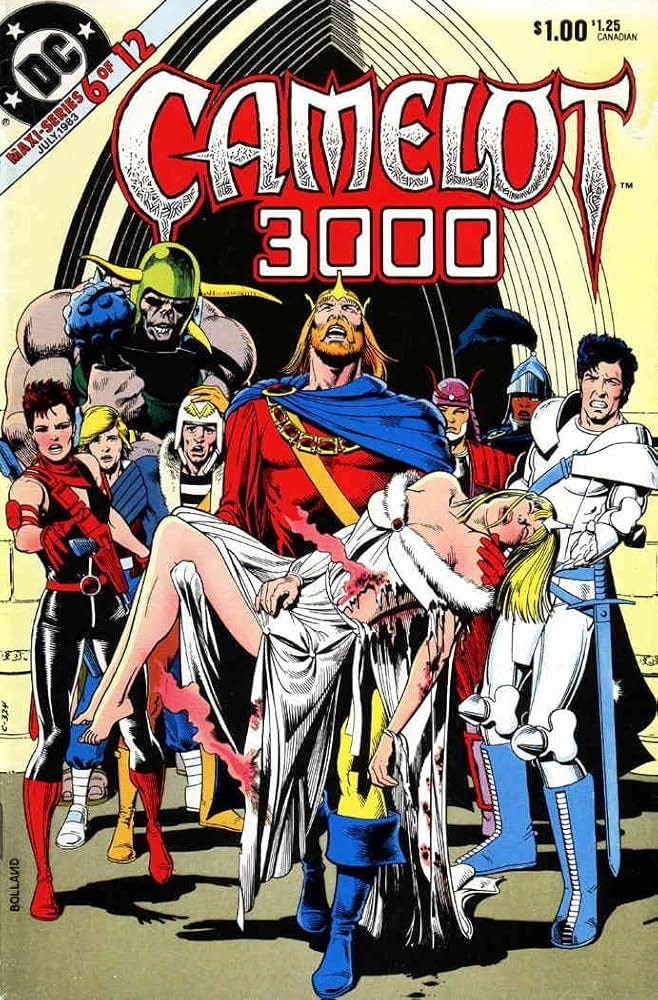KAOS: Episode 8
I shaved my legs for this?
KAOS is a new Netflix series setting all the gods and goddesses of Greek mythology in a vaguely contemporary world. It is part comedy, part drama and part absurdist deconstruction of all of the above.
Homer, Talk To Me: An increasingly unhinged Zeus decides the only way to defy his prophecy is to destroy the Fates. So he heads over to the Cave where the Fates eagerly accommodate his wish to destroy them. The trio clamber around the pool table, dousing themselves with kerosene or gasoline or whatever, which convinces Zeus, the poster child for narcissistic personality disorder, that what he’s doing is good and proper. Of course, the Fates, with their ambiguous answers and equally ambiguous running commentary, offer no such assurances. Zeus sets the flammable liquid alight and the Cave explodes in the most unconvincing fireball not seen since 1980s made-for-TV action movies went the way of the dodo. Before they go up in flame, however, they squeal that Dionysus swiped Zeus’ watch (giving it back) and that Hera and Poseidon are up to something behind Zeus’ back.
On their way back to the land of the living from the Underworld, Riddy confesses to Orpheus that she doesn’t love him and hasn’t for some time. Orpheus, who also has a pretty advanced case of narcissistic personality disorder, is surprisingly cool with that. They reach the surface through the Cave’s dumpsters—which are surprisingly undamaged by the earlier explosion, and part ways. Riddy, walking down a desert highway, encounters Cassandra, who informs her that Riddy is now a prophet as well.
In the Underworld, Caeneus makes up his mind to stop as many souls from going through the frame as possible. But then his mother, who killed herself in the previous episode (did I mention that?) shows up, insisting that Caeneus must go through the frame that day in order to bring about renewal. Canaeus, having seen what happens when souls go through and end up in the Nothing, is having none of it. His mother makes a break for the Frame and Caeneus chases after, not noticing that he’s able to fully enter the River Lethe. Then he and his mother get sucked through the frame where they subsequently become decaying waxy statues in the Nothing. Except Caeneus’ forms starts to glow and his soul revives. Seeing his mother in a creepy, statuesque state, he hugs her and after a minute she glows and revives. Hades, who’d been trying unsuccessfully to revive souls by doing the reverse-forehead-bump he sucked Nax’s soul with a few episodes back, shows up to ask how Caeneus succeeded where a god failed.
Zeus returns to Olympus, where Hera, Poseidon and Dionysys are trying to stage the lamest intervention ever. Zeus brags about killing the fates and confronts Dionysus about the watch. Dionysus confesses about stealing the watch and helping Orpheus retrieve the soul of Riddy. Zeus, in a subtle move intended to show he’s not a sympathetic character, stabs to death Dennis, Orpheus’ kitten, who Dionysus had been taking care of for the past seven episodes. Poseidon confesses his love for Hera. Hera dismisses him and then Zeus demotes him.
Zeus then goes to gloat/confide in Prometheus, who’s been observing the growing trainwreck with increasing shock and alarm. Mid-conversation, Prometheus vanishes from the cliff he’d been chained to, baffling Zeus (who apparently is the only one who can make folks vanish with a snap of his fingers). Prometheus appears in the halls of Olympus, where the disembodied voices of the Fates tell him cryptic things essentially amounting to “You’re free.” Zeus finds Prometheus sitting on his throne, but before he can do any narcissistic god stuff, he starts bleeding from a cut on his hand which fulfills a vision he had earlier. At that point the spinning Meander Water fountain collapses, signalling the end of Zeus’ reign. Elsewhere, Poseidon and Hera flee Olympus, prepping for war with Zeus (or each other).
The Oracle Says: In the early 1980s there was a miniseries published by DC Comics called Camelot 3000. It was hyped as the first graphic novel—a complete, self-contained story told with sequential art, intended for adult readers as opposed to kids. The individual issues were collected into a single volume and it was hailed as a landmark achievement for the medium.
When I finally got ahold of this graphic novel in late 1988, I read it eagerly but ended up thinking, “Is that all there is?” For those unfamiliar with Arthurian mythology, once Arthur is mortally wounded by his bastard son Mordred, he goes to sleep in the Hollow Hills until the day he rises again at the time of England’s greatest need. In Camelot 3000, Arthur rises again a thousand years from now, juxtaposing a fantasy figure in a science fiction setting. Brilliant, right? Well, not so much. Apart from shifting the timeframe and gender bending some of the familiar characters from the mythos, the authors of Camelot 3000 chose to replay all the same mythology stories again, in the same way, with the same outcomes. It’s like Lancelot and Guinevere learned nothing from their illicit affair 2,500 years earlier. Like Arthur and Mordred thought “we can fight again in the exact same circumstances but this time I’ll win, for some hand-wavey reason.” In short, the creators had exactly one interesting idea—awakening King Arthur in the far future—and that’s as far as it went. They had no vision of what to do with this epic cast of characters beyond that, so they opted for the least inspired course possible, which was to retell the original stories.
KAOS is 2024’s version of Camelot 3000. Other than setting Greek mythology in a vaguely contemporary society, they’re bringing nothing new to the table. Granted, there are some nice details. The Greek gods are portrayed as the dangerous, feckless, self-absorbed monsters they were in the original mythos. And the various ethnicities, sexualities and gender identities portrayed in the series are a more accurate representation of ancient Hellenistic society than the stoic, sanitized versions we normally get in popular media. But that’s just window-dressing at best. Here we have a reality in which magic and the supernatural unequivocally exist yet the show goes out of its way to minimize, deemphasize or otherwise erase any traces of such. Orpheus is presented as this reality’s version of a male Taylor Swift yet apart from one mediocre song in the first episode the series contorts itself to keep him from singing. Note to producers: Singing is Orpheus’ primary personality trait in mythology. I mean, hell, had you cast Ed Sheeran you could’ve had three or four musical interludes every episode. Speaking of Orpheus, he is weirdly okay with Riddy not being his wife anymore. I kept waiting for Mr. Self-Absorbed to turn on her during the trek up from the Underworld, to inflict some horrific undead domestic violence upon poor Riddy, casting her back amongst the dead in a cruel parody of the original myth… but nope. He hugs her, wishes her well and they happily go their separate ways. Now, I’m not a fan of domestic violence, but Orpheus’ smothering, obsessive possessiveness was the ticking Chekhov’s gun on the wall from early in episode 1. Instead of said gun going boom, we learn that Orpheus ain’t such a bad guy, as long as you ignore the cold-blooded murder of Anatolein episode 4.
And the reality this story exists in… oh, dear lord, the gods rule over the entire world yet the only place they seem to have any interest in is Krete. And surprise! Krete is the only place characters live who do anything that impacts the plot at all. I think maybe Athens is mentioned once? They talk about Troy, but that’s long destroyed. And that’s a big part of the problem. Billed as an epic series with a sprawling cast, KAOS seemed to grow smaller and more insular with each episode. Early on, when Zeus tried to call his other deified children only to get their voicemail, it was cute. When the gods stage an “intervention” and only the same three show up that we’ve seen the whole series, that screams “budget constraints.”
Episode 8 was not the finale this story arc. Rather, it existed solely to set up a potential season 2. In my review for episode 7 I said the story arc felt over, complete, and nothing that happened in episode 8 changed my mind. The problem, I think, resides in the fact that series creator Charlie Covell hasn’t got anything to say beyond, “What if the Greek gods existed in modern times?” If they’re making any other thematic point other than your run-of-the-mill “organized religion is a scam” stalking horse I’m at a loss to figure out what it is. I started watching this series because critics hailed it as a biting satire (it’s not) and a hilarious black comedy (it’s not). You want biting satire and black comedy that dangerous and pushing boundaries? Go watch Chris Morris’ 2010 film Four Lions. Hell, the most daring thing KAOS does is have Zeus stab a kitten, and even that happens off-camera. KAOS is nowhere near as funny as it thinks it is, as serious as it thinks it is, nor as transgressive as it thinks it is. It pulls back at every opportunity to fundamentally jar the audience, contenting itself to slightly brush up against a general audience’s comfort zone. The easy critique would be to point to Game of Thrones as a mature series that was not afraid to twist the knife in the viewing audience’s metaphorical gut, but that’s too easy (not to mention the fact that GOT became a self-parody with the gratuitous nudity and violence). No, instead I’d refer to the earlier, and more period-appropriate HBO series, Rome, as the show KAOS should be endlessly cribbing from. In Rome, family drama resulted in thumbs being cut off and literal backstabbing well before the season 1 finale. In KAOS, they have concepts of betrayal.
It may sound like I passionately hate KAOS. Nothing is farther from the truth. Hate would take effort. No, I am completely and utterly indifferent to it, at most exasperated by the profound lack of imagination that went into the production. It is a perfectly mediocre effort, filled with fine actors who do their best to bring mediocre script pages to life. There is nothing here—not even Jeff Goldblum as Zeus—that is memorable, and I doubt I shall ever think of this monument to wasted potential ever again.





I'm so glad it wasn't just me.
At the end of the fourth episode, I was ready to bail, but I thought, "After that set-up, surely this is going to pay off, right?" and stuck it out. Always trust your gut on things like this.
Thank you. This essay helped solidify something that had been running on the back of my brain about streaming television for a while: the followthrough. Namely, how can you do a modern take on older myths when half of the viewership will scream bloody murder if the story doesn't hew directly to the original, the other half get upset at being expected to do homework for their television, and the executives who signed for it did so only because they half-remember reading about it in grade school?